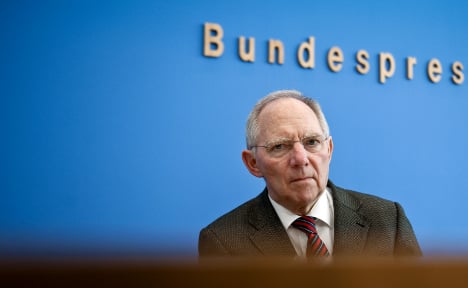Wolfgang Schäuble spoke at a press conference in Berlin after a telephone conference call with the Eurogroup to take stock of private investor acceptance of a Greek debt swap.
The swap, which was taken up by 83.5 percent of Greece’s private creditors, was needed for the release of a €130 billion, second aid package from eurozone partners for Athens to help it avert a default.
The rest of the funding, €94.5 billion, is essentially loans to Athens and would probably be released next week, Schäuble said, when “formal conditions” are met, something which is not in doubt.
“We are not out of the woods but we have taken an important big step,” Schäuble said.
European leaders are now waiting for the International Monetary Fund to say how much it will contribute to the second aid programme for Greece.
The private investor acceptance of a Greek debt swap was a historic chance to stabilise Greece, officials said, but analysts warned that this was not the end of the Greek drama.
The head of Eurogroup eurozone finance ministers Jean-Claude Juncker said the “elements were now in place” to proceed with final approval for a second bailout for Greece.
“I welcome the significant progress achieved in the preparation of the second Greek adjustment programme,” Juncker said.
EU Economics Affairs Commissioner Olli Rehn said he was “very satisfied” with the participation by private investors in the voluntary debt swap adding that the result was a “decisive contribution to financial stability in the euro area as a whole.”
IMF head: eurozone crisis risk removed
International Monetary Fund head Christine Lagarde, before the official take-up rate was announced, said the risk of crisis in the eurozone had been “removed” for now.
Lagarde said that the “real risk of a crisis, of an acute crisis, has been, for the moment, removed.”
She later called the deal “an important step that will dramatically reduce Greece’s medium-term financing needs and contribute to debt sustainability.”
Deutsche Bank head Josef Ackermann, who chairs the Institute of International Finance which negotiated the deal on behalf of major private creditors, said the swap was a “very strong and positive result”.
It provided a “major opportunity for Greece to move ahead with its economic reform program” and strengthened the eurozone’s “ability to create an economic environment of stability and growth”, Ackermann said.
Analysts also expressed some relief at the successful exchange, but warned that it still left Greek government debt at an unsustainably high level.
Siemens agrees deal with Greece
The German economics ministry said on Friday that a deal between German electronics giant Siemens and Greece to end a decade-old bribery scandal was an “encouraging” first sign of economic cooperation.
The €270 million ($357 million) deal, announced on Thursday in Athens and which must still be ratified by the Greek parliament, is “a first important, cheering and encouraging sign”, a German ministry spokesman said.
The Greek government last year demanded compensation from Siemens, which has admitted using a slush fund to obtain foreign contracts.
The deal includes Siemens paying €90 million to the Greek government to help it fight corruption and €80 million to help it pay off debts.
The German group would also “invest €100 million in Greece in 2012”, and would “examine the possibility of setting up a €60 million production plant” in the country, the Greek finance ministry said.
However, while the deal settles the question of “administrative fines”, it does not close the door to judicial prosecution.
Siemens declined to comment on the deal.
AFP/hc



 Please whitelist us to continue reading.
Please whitelist us to continue reading.
Member comments